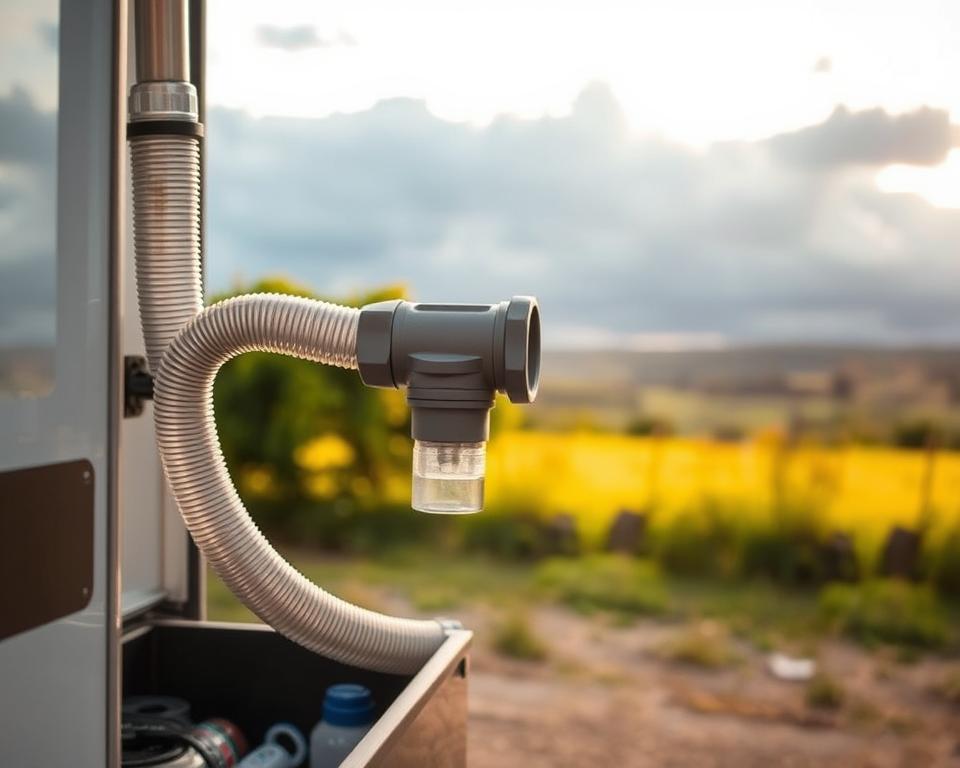Mobile Trailer Septic Tank Pumping: Essential Guide
Have you considered the repercussions of overlooking your RV’s septic system? For those who own RVs and mobile units, it’s imperative to recognize the importance of RV septic Tank Pumping. It maintains your travels are uninterrupted and living conditions stay sanitary on the road. By stressing regular portable RV waste pump, this resource seeks to make you prepared in maintaining your septic system, avoiding potential headaches — especially when embracing the great outdoors.
In this article, a deep dive into selecting reliable mobile septic services is offered. What’s more, learn to spot when your septic Tank requires quick attention. Grasping the process for proper trailer septic Tank Pumping is also covered. Instead of reacting to issues as they occur, allow this guide to arm you with necessary knowledge. This ensures your RV experiences keep stress-free!
The Importance of Consistent Trailer Septic Tank Pumping
Timely servicing of your camper’s septic Tank is crucial for its wastewater system’s functionality. Skipping this can result in clogs and backups, spoiling your vacation and impacting the environment. Sewage leaks from an excessive Tank can contaminate the area, posing major problems.
Using professional Pumping services like All-In Sanitation is wise for trailer owners. This action heads off issues and extends your system’s functionality and longevity. On-schedule Pump-outs mean a safer, safer environment in RV parks and campgrounds.
Understanding Your RV’s Septic System
A camper septic system features three primary elements: the black water Tank, grey water Tank, and fresh water Tank. For RV owners, it’s critical to know these parts. They are central in waste management. The black water Tank holds toilet sewage, and the grey water Tank collects water from sinks and showers.
Each Tank has a distinct role in keeping the rig sanitary and operational. Monitoring the levels in the black water and grey water Tanks is important. It helps avoid overflows, bad smells, and damage to the septic system.
To illustrate, below is a table that shows differences between the black water and grey water Tanks:
| Feature | Black Water Tank | Grey Water Tank |
|---|---|---|
| Purpose | Stores sewage waste | Collects wastewater from sinks and showers |
| Maintenance Frequency | Requires regular Pumping | Needs infrequent emptying |
| Potential Issues | Odors, blockages from solids | Risk of grease buildup |
| Typical Size | Generally bigger than grey water Tank | Smaller than black water Tank typically |
Understanding your trailer’s septic system is fundamental for maintenance. It guarantees smooth travel experiences. Watching both Tanks means trips with minimal septic concerns.

Signs Your Septic Tank Needs Pumping
It’s vital to recognize when your septic Tank needs Pumping to maintain your system efficient. Catching issues early can get around major repairs and environmental harm. Primary signs that need attention include:
- Slow draining sinks, which may signal a full Tank or clog.
- Gurgling toilets, suggesting blocked pipes or a failing septic system.
- Foul odors around your camper, an early warning of rising sewage.
- Pooling water near the drain field, revealing that your Tank may be overwhelmed.
- Sewage backups in your toilets or drains, a sure sign prompt action is needed.
Becoming aware of these signs allows RV owners to act swiftly, heading off grave issues. Monitoring your system and addressing to these indicators can extend your septic system’s lifespan. This approach leads to a better RV experience.
What Determines Pumping Frequency
A septic Tank’s volume directly determines how often it demands Pumping. Larger Tanks need less frequent service because they contain more waste, whereas smaller Tanks demand more frequent Pumping.
The fleet size using the septic system also affects Pumping frequency. With more RVs, the system experiences greater strain, necessitating accelerated Pumping. Notably through peak seasons, tweaking the schedule is key to avoid problems.
Here is a table that presents recommended Pumping intervals based on typical scenarios:
| Septic Tank Size | Number of RVs | Recommended Pumping Frequency |
|---|---|---|
| 500 gallons | 1-2 RVs | Roughly every 2-3 years |
| 1000 gallons | 2-4 RVs | Every 3-5 years |
| 1500 gallons | 4+ RVs | Approximately every 1-2 years |
Properly determining your septic Tank’s Pumping frequency enhances its operation. It also increases its life and effectiveness. This selection is vital for maintaining system health.
How to Choose a Dependable Septic Pumping Service
Choosing a solid septic Pumping service is key for your trailer’s septic system health. It secures swift and effective Pumping, preventing pricey future repairs. When evaluating a septic service provider, weigh these key aspects:
- Experience: Search for companies with a solid track record. Their hands-on know-how with various septic systems, especially those for RVs, is paramount.
- Customer Reviews: Explore online reviews and testimonials. Glowing feedback and strong ratings are markers of a dependable provider.
- Response Time: Quick response times signal a company’s commitment to their customers and readiness to meet their needs efficiently.
- Knowledge of Systems: Deep knowledge of trailer septic systems distinguishes some services. Providers like All-In Sanitation understand these systems well, enabling bespoke service.
Prioritize these considerations to secure the most appropriate service for your septic requirements. A trustworthy septic Pumping service enhances your system’s life and performance, enabling carefree travel adventures.
Trailer Septic Tank Pumping: What Happens
Trailer septic Tank Pumping includes critical steps for efficiency and safety. It’s important for RV owners to know this process before service appointments.
A technician with a trailer-mounted Pump shows up first, tailored to mobile systems. This technology facilitates effective waste removal while protecting the environment. They couple the Pump to the trailer’s system with a hose reaching the Tank.
The Pump then extracts the waste out of the Tank. This action is critical to keep the septic system sound and stop overflow. After emptying, the technician examines the Tank for damage or wear, ensuring proper function.
Following the Pump-out, waste disposal is the next step. The hauled waste is transported to treatment facilities for safe processing. This step minimizes environmental harm.
The process benefits from the trailer-mounted Pump’s effectiveness. Scheduled service saves time and cost, maintaining the septic system in prime condition.
24/7 Septic Pumping Services
Unplanned issues with your septic system can require prompt intervention. For RV enthusiasts, understanding when to request emergency septic Pumping is vital to avert further damage and excessive costs. Situations demanding urgent septic Tank Pumping include backups, unpleasant smells, and sewage leaks. Rapidly tackling these issues often requires septic Tank Pump and haul services to efficiently eliminate waste and regain system functionality.
Providers like All-In Sanitation offer 24/7 emergency septic Pumping, ensuring help is always available when urgently needed. Taking initiative with these services markedly boosts your septic system’s lifespan and performance. Having a trusted septic service readily accessible can reduce expenses and stress in emergencies, guaranteeing uninterrupted enjoyment of RV adventures.
Pointers for Caring for Your RV Septic System
Keeping your camper’s septic system in prime shape is vital. Smart maintenance strategies can prevent expensive problems later. First, do regular checks for damage, leaks, or strange smells for RV septic Tank care.
Correct waste disposal is paramount for a healthy system. Do not flush items that won’t break down, and choose septic-friendly products. It’s important that everyone understands how their actions affect the septic system. This guarantees it remains functional and efficient.
- Carry out periodic checks for leaks and unusual odors.
- Stay in touch with your septic service provider for prompt maintenance.
- Utilize septic-safe toilet paper and cleaning supplies.
- Avoid pouring chemicals down the drain that could harm the balance of bacteria in the Tank.
- Plan for regular professional inspections to detect potential issues early.
Implementing these steps helps RV owners prolong their trailer septic systems’ life and performance.
Usual Troubles with RV Septic Systems
Trailer septic systems often encounter issues that frustrate RV owners. Solve these issues early to avoid bigger problems later. Clogs in septic Tanks are frequent, mainly due to not disposing of waste properly. To prevent clogs, use RV-safe toilet paper and do regular maintenance.
Another big issue is odor control. Bad smells can point to backups or leaks, needing immediate action. To reduce odors, ensure the system is well-ventilated and the septic Tank is emptied regularly.
Leaks can appear from wear or incorrect installations. Swift identification of leaks aids stopping environmental damage and keeps the system working. Routine inspections are important to spot these issues early.
To avoid common issues, use preventative strategies like routine service and proper waste disposal. Informed and proactive RV owners can enjoy their travels care-free and with peace of mind.
In Summary
Mastering trailer septic Tank Pumping is key for RV and trailer owners. Scheduled maintenance and recognizing trouble signs in your septic system can boost your RVing experience greatly. Managing your RV’s septic system well ensures both safety and comfort during your outdoor adventures.
Opting for a trustworthy service for your trailer’s septic Tank Pumping is critical. Working with experts like All-In Sanitation guarantees your mobile waste management is high-quality. This approach is not just green, but it also elevates* the camping experience, making it more enjoyable and sustainable.
Actively maintaining your septic system cuts emergencies, improving your nature stays. Thorough care and understanding empower memorable trips for the best reasons.

